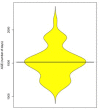Exploring the Onset of a Male-Biased Interpretation of Masculine Generics Among French Speaking Kindergarten Children
- PMID: 31191413
- PMCID: PMC6549491
- DOI: 10.3389/fpsyg.2019.01225
Exploring the Onset of a Male-Biased Interpretation of Masculine Generics Among French Speaking Kindergarten Children
Abstract
In French, and other gender marked languages, there are two ways to interpret a grammatical masculine form when used to refer to social roles or occupations [e.g., les magiciens (the magicians masculine )]. It can refer to a group composed of only men (specific use of the masculine form), or one composed of both women and men (generic use). Studies of adults revealed that the rule that masculine forms can be interpreted as inclusive of either gender is not readily applied. To gain a better understanding of the processes shaping this phenomenon, we present a follow-up study (N = 52) to Lévy et al. (2016) to explore how French-speaking kindergarten children (3-5 years of age) resolve the semantic ambiguity of the grammatical masculine form when presented with role or occupation nouns. In a paradigm where participants' gazes were monitored, children were presented with pictures of a pair of two boys and a pair of one girl and one boy and were prompted to Look at the [role nounmasculine plural form]. First, the results suggest a stereotype effect in that children more strongly directed their gaze toward the boy-boy picture for stereotypical male role nouns, but toward the girl-boy picture for stereotypical female role nouns. Second, in the non-stereotypical/neutral condition we did not find an indication of any own-sex preference (as in Lévy et al., 2016), but of an influence of the role nouns' grammatical gender, in that children more strongly directed their gaze toward boy-boy pictures than toward girl-boy pictures. We suggest that a specific interpretation of masculine forms might already start to emerge between 3 and 5 years of age, while gender stereotypes are still activated.
Keywords: gender representation; generic masculine; grammatical gender; kindergarten learning; role noun.
Figures






References
-
- Baayen R. H. (2008). Analyzing Linguistic Data. Cambridge: Cambridge University Press.
-
- Brysbaert M. (2007). The Language-as-Fixed Effect Fallacy: Some Simple SPSS Solutions to a Complex Problem. Egham Hill: Royal Holloway, University of London; 10.1044/1092-4388(2001/072) - DOI
-
- Chatard A., Guimond S., Martinot D. (2005). Impact de la feìminisation lexicale des professions sur l’auto-efficaciteì des eìleÌves: une remise en cause de l’universalisme masculin? [Occupational self-efficacy as a function of grammatical gender in French]. L’Anneìe Psychol. 105 249–272. 10.3406/psy.2005.29694 - DOI
LinkOut - more resources
Full Text Sources

